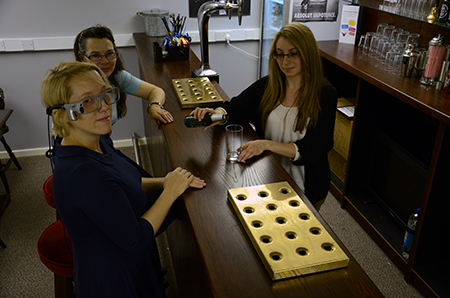Marianne Erskine-Shaw in the University’s bar-lab, with Dr Kate Bennett and Dr Abi Rose, who wears special glasses that monitor the eyes’ gaze
A University of Liverpool student has been awarded a British Psychological Society summer studentship to look at the effects of alcohol advertising on choice and behaviour.
The award is one of only 10 studentships awarded every summer and provides top undergraduates with hands-on research experience. It is regarded by many as an award that marks out a student as a future researcher and potential academic.
Positive and negative alcohol advertising
Marianne Erskine-Shaw, who is a Psychology undergraduate student, was awarded the coveted studentship for a study looking at the effects of explicitly positive and negative alcohol advertising on alcohol choice and behaviour.
She is being supervised by Dr Kate Bennett in the Department of Psychological Sciences and Dr Abi Rose, who is part of the Department’s Addiction Research Team with expertise in the mechanisms underlying alcohol-related behaviour. The research took place over the summer in a specially adapted bar-lab – the only laboratory of its kind in the UK which has been made to look like a typical drinking environment.
The bar-lab is the only one of its kind in the UK, and aims to imitate a typical drinking environment
The study is exploring whether intoxication can change the way a person behaves including how they respond to positive and negative alcohol advertising.
It will measure the effects of different advert types on choice behaviour when the participants are both sober and intoxicated. The expectation at the outset of the study was that intoxication may strengthen the underlying motivation to drink in a typical drinking environment, with positive adverts having a greater influence while negative adverts may be ignored.
Inform health strategies
If these possibilities are confirmed once the study is complete, it could inform health strategies aimed at reducing the occurrence of binge drinking, as well as raising questions about whether the level of positive alcohol advertising in drinking establishments should be reduced.
Dr Abi Rose from the University’s Department of Psychological Sciences said: “Marianne has already proved herself to be a high-achieving student and we’re delighted to be able to support her in a study which, if it produces significant results, could have real implications for health policy.”
The British Psychological Society makes Undergraduate Research Assistantship grants every summer to allow researchers to develop student potential and interest in research. The scheme gives students the chance to gain an insight into scientific research and encourages them to consider an academic career.
